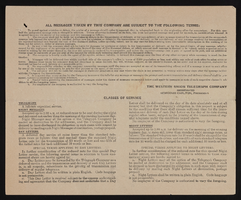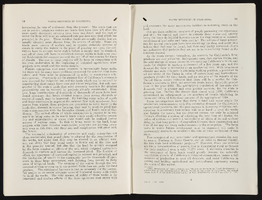Search the Special Collections and Archives Portal
Search Results
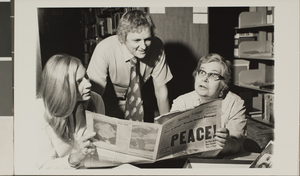
Photograph of individuals at Special Collections, University of Nevada, Las Vegas, September 1975
Date
Archival Collection
Description
From left to right: Susan Jarvis, Hal Erickson, and Alfreda Blood in the Special Collections department at the University of Nevada, Las Vegas (UNLV). They are examining the Leonard T. Blood papers just donated to UNLV Special Collections.
Image
Lawrence Revere Papers
Identifier
Abstract
The Lawrence Revere Papers primarily consist of correspondence between Lawrence Revere and the developers of blackjack betting systems dating from 1965 to 1970. The collection includes information about blackjack gambling systems, correspondence with gambling experts, and press material regarding the publication of Revere's book
Archival Collection
Paul J. Richert Photograph Collection
Identifier
Abstract
The Paul J. Richert Photograph Collection (approximately 1950-1951) consists of black-and-white photographic prints and negatives depicting the swimming pools at the Desert Inn and Flamingo Hotel & Casino in Las Vegas, Nevada. Also included is an image of the Las Vegas High School Rhythmettes dance group and an image of the El Rancho Hotel and Casino in Las Vegas.
Archival Collection
Nadine Tobin Collection of Helldorado Photographs
Identifier
Abstract
The Nadine Tobin Collection of Helldorado Photographs, approximately 1940 to 1959, contains black-and-white photographic prints depicting parade floats during Helldorado Days celebrations in Las Vegas, Nevada. Also included is one image of a primary school class in Las Vegas.
Archival Collection
First Good Shepherd Lutheran Church Photograph Collection
Identifier
Abstract
The First Good Shepherd Lutheran Church Photograph Collection, approximately 1930 to 1950, consists of black-and-white photographic prints and negatives depicting the construction of the Good Shepherd Lutheran Church in Las Vegas, Nevada. Also included are images of parish leaders and the ground breaking ceremony for the grand opening.
Archival Collection
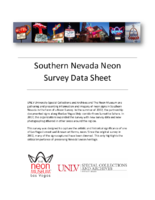
Fishers Inn Motel Neon Survey document, September 16, 2017
Date
Archival Collection
Description
Site address: 3565 Boulder Hwy
Sign owner: Maiya LLC
Sign details: The construction of the motel was in 1963. This location was previously the Comet Motel but the Fisher's bought it in 1987 and changed the name to Fisher's Inn Motel.
Sign condition: 5 - received new paint in 2017
Sign form: Raised roadside sign
Sign-specific description: This sign has a thin white steel beam base with plastic backlit sign that currently advertises ESPN, HBO, Over 150 channels and Free Wifi. Above the reader board is a rectangular (but has a curved portion to the top of it) blue sign that states "FI" on top in a cursive font, underneath in a block white font states "A Fisher's Inn". Underneath "A Fisher's Inn" there is are big yellow "MOTEL" block font letters with a simple "No Vacancy" skeletal neon beneath it. At night the "FI" illuminates yellow, "A Fisher's Inn" green, " MOTEL" red, "NO VACANCY" is blue, but on the top portion of the sign there is white skeletal neon in the shape of possibly a Fisherman's hat.
Sign - type of display: Neon and backlit plastic sign
Sign - media: Steel and plastic
Sign - non-neon treatments: Backlit plastic sign
Sign environment: This motel is on Boulder Highway, close to the 515 and is near other motels and car sales lots.
Sign - date of installation: c. 1987
Sign - date of redesign/move: 2017 painted blue when it used to be green
Sign - artistic significance: There's a good use of multiple colors on this sign. As well as repurposing older signs from previous property has been a major trend for signs in Vegas. Good example of skeletal neon.
Survey - research locations: Assessor's website
Survey - research notes: Bookings website gives hotel info https://www.booking.com/hotel/us/a-fishers- inn-motel.html
Surveyor: Emily Fellmer
Survey - date completed: 2017-09-16
Sign keywords: Neon; Backlit; Plastic; Steel; Roadside
Text
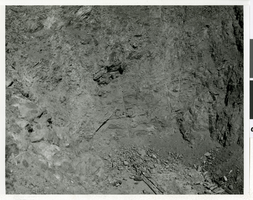
Photograph of the "Mole" Jarva Tunnel Borer at work on the Las Vegas River Mountain Project, Las Vegas, Nevada, circa 1968-1971
Date
Archival Collection
Description
Image
Audio recording clip of interview with Faye Todd by Claytee D. White, October 15, 1996
Date
Archival Collection
Description
Part of an interview with Faye Todd by Claytee White on October 15, 1996. Todd discusses how she came to work for the Landmark and what it was like to work with entertainers.
Sound

